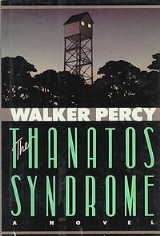
The Thanatos Syndrome
Encyclopedia
The Thanatos Syndrome was Walker Percy
's last novel before his death. It is a sequel to Love in the Ruins
. It tells the story of a former psychiatrist who suspects that something or someone is making everyone in the town crazy.
In 1989, Percy stated that, in The Thanatos Syndrome:
Critic Allen Pridgen—in his book, Walker Percy's Sacramental Landscapes (2000) -- describes the "disconnectedness" that the protagonist, Dr. Tom More, begins to notice in The Thanatos Syndrome:
Pridgen points out that it is not just the victims of the chemical additive in the drinking water who are being "impoverished":
Walker Percy
Walker Percy was an American Southern author whose interests included philosophy and semiotics. Percy is best known for his philosophical novels set in and around New Orleans, Louisiana, the first of which, The Moviegoer, won the National Book Award for Fiction in 1962...
's last novel before his death. It is a sequel to Love in the Ruins
Love in the Ruins
Love in the Ruins is a novel of speculative or science fiction by author Walker Percy from 1971. It follows its main character, Dr Thomas More, namesake and descendant of Sir Thomas More author of Utopia, a psychiatrist in a small town in Louisiana called Paradise...
. It tells the story of a former psychiatrist who suspects that something or someone is making everyone in the town crazy.
In 1989, Percy stated that, in The Thanatos Syndrome:
"I tried to show how, while truth should prevail, it is a disaster when only one kind of truth prevails at the expense of another. If only one kind of truth prevails -- the abstract and technical truth of science -- then nothing stands in the way of a demeaning of and a destruction of human life for what appear to be reasonable short-term goals."
Critic Allen Pridgen—in his book, Walker Percy's Sacramental Landscapes (2000) -- describes the "disconnectedness" that the protagonist, Dr. Tom More, begins to notice in The Thanatos Syndrome:
"Perhaps the single most important idea in Percy's epistemology, expressed again and again in his essays and interviews (especially MB, 282), is his conviction that this kind of impoverishment in the power to name experience causes a subsequent impoverishment of consciousness and being since it is only through language transactions with others that the self locates who and where it is."
Pridgen points out that it is not just the victims of the chemical additive in the drinking water who are being "impoverished":
"....but also the scientists who victimize and study them. They, including Tom, are enclosed in a lifeless, self-constructed interior world of scientific abstractions that numb them to the realities of the phenomenal world and the flesh-and-blood people in it. All, Percy maintains, are casualties, of a 'century of death' (MCON,120-21), an 'age of thanatos' (TS, 86)."

